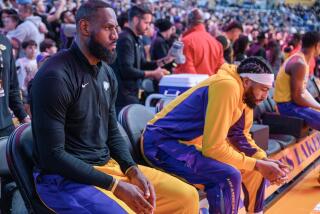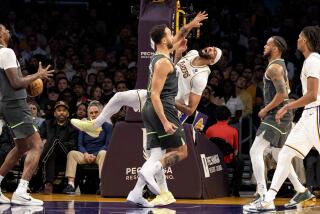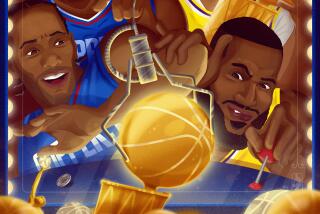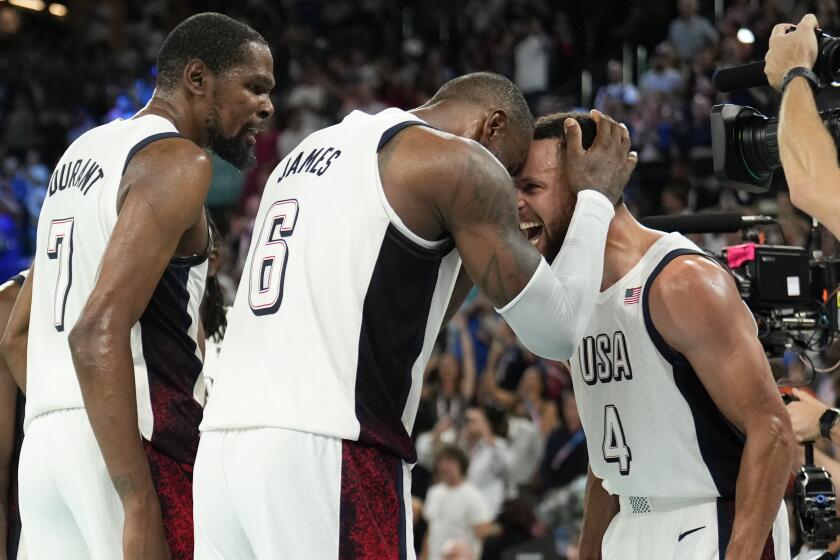Lakers report card: Matt Barnes’ playoff output soured season
This is the ninth in a series of posts grading the Lakers on the 2011-12 season.
Player: Matt Barnes
How he performed: 7.8 points on 45.2% shooting from the field and 33% from three-point range and 5.5 rebounds in 22.5 minutes in regular season; 3.5 points on 27.1% shooting from the field and 16.1% shooting from three-point range and 3.3 rebounds in 16.8 minutes in postseason.
The good: Even with Mike Brown’s dizzying rotations at small forward, Barnes remained the team’s most reliable reserve in the regular season. That’s no small task considering Barnes jumped around from not playing at all, starting at small forward, and then coming off the bench behind Metta World Peace. Regardless of the fluctuating role and minutes played, Barnes stayed consistent on making hustle plays, throwing effective outlet and swing passes, cutting into the lane and making offensive putbacks.
In some moments, Barnes became the team’s wild card when Kobe Bryant, Andrew Bynum and Pau Gasol met persisting double teams. He posted double-digit scoring figures in 20 games. Barnes scored in such fashion in four consecutive games in April, including a 24-point effort on nine-of-11 shooting, four-of-four from three-point range and 10 rebounds in the Lakers’ 103-97 win April 11 against Denver. After the Lakers acquired Ramon Sessions, it appeared Barnes immediately benefited from his presence. Sessions’ quick speed complemented Barnes’ sharp off-ball cutting and ability to find open gaps in transition. The Lakers as a whole lacked a dependable reserve unit that could produce despite not having any plays called for them. During the regular season, Barnes became the team’s main exception to that trend.
The bad: That effectiveness didn’t translate at all in the playoffs. Barnes’ play partly plummeted because he sprained his right ankle a week before the postseason and then suffered a neck injury after his son jumped on him a few days later. But that doesn’t fully account for how much of a liability Barnes quickly became. He always remained an inconsistent three-point shooter and defender, but most of his shots looked downright awful. Barnes rarely took shots in rhythm. His decision to take extra shots after the Lakers’ Game 2 win over Denver did nothing to snap him out of his funk. Barnes didn’t even compensate those shortcomings by resorting to his usually reliable hustle plays, rebounds and spacing.
His play spiraled out of control so much that Brown played Barnes only 11.3 minutes per game in the Oklahoma City series. Barnes even sat on the bench for all of Game 5 in what marked the Lakers’ last playoff game.
Grade: C
It’s understandably frustrating that an injury hampered Barnes’ postseason run for the second consecutive season. But Barnes failed to compensate in other areas and allowed that discomfort to affect his confidence. It’s widely expected the Lakers won’t keep him after he becomes an unrestricted free agent. It’s kind of a shame considering Barnes spent the last two seasons really proving he’s a dependable role player. But that was nonexistent in the playoffs. Whether it was circumstantial or not, that’s the standard the Lakers measure. And when the moment counted, Barnes failed to deliver.
RELATED:
Lakers report card: Front office has mixed results
Lakers report card: Kobe Bryant provides a mixed blessing
Lakers report card: Mike Brown’s a worker, but not a leader
Email the Lakers blog at [email protected]. Follow the Lakers blog on Twitter.
More to Read
All things Lakers, all the time.
Get all the Lakers news you need in Dan Woike's weekly newsletter.
You may occasionally receive promotional content from the Los Angeles Times.








